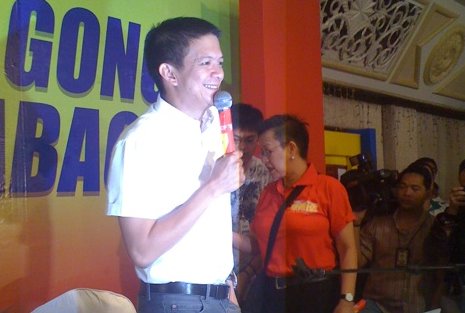
Sen. Chiz Escudero today surprised the nation by announcing his resignation from the Nationalist People’s Coalition and begged for time to make a final decision on a possible presidential candidacy in 2010.
Speaking before media and supporters at Club Filipino, Escudero railed against party politics and attempted to tackle specific people’s issues — surprise! surprise! — as he explained his decision to resign from his erstwhile party:
Answering reporters’ queries, Escudero said he informed the NPC party chairman Governor Faustino Dy Jr. last night about his resignation from the party “and no one else”, apparently referring to NPC founder Danding Cojuangco. Never did he mention Danding’s name.
It is possible that Escudero may have felt compelled to quit the NPC. Reports are rife that the powerful NPC founder is allegedly talking with other candidates outside the party despite Escudero’s obvious readiness to carry the party colors. Just last week, it was reported that cousins Danding and Peping were talking about a possible alliance in favor of Liberal Party standard-bearer Noynoy Aquino. Previously, NPC stalwart Sen. Loren Legarda declared her intention to run for vice president but did not state her support for Escudero who was the only NPC member jockeying for nomination by the NPC.
The NPC in fact has two wings: a pro-administration wing and an oppositionist wing. Escudero’s departure may be a sign that pro-administration NPC members may gaining an upper hand within the party. It is not impossible for NPC to forge a grand coalition with Lakas-Kampi to thwart the Liberal Party, and maintain a status quo that is generally favorable to the political and economic interests of NPC leaders and members.
Escudero’s disenchantment with party politics is well-understood by the public. We all know that traditional political parties are only good as vehicles for winning political posts and for political patronage. If he chooses to rebel against this concept and develops a new movement that respects and empowers the electorate, that would be a step in the right direction. Besides, he cannot win by himself. He has to capture the support of the public to vote for him, to guard his votes. Only a grassroots movement can do this for him, and it would entail putting out a political program and platform that is substantially progressive and patriotic, and not just pa-pogi.
If he manages to do this, it would herald a new dawn in presidential electoral politics and it can outshine the fake halo that is used prettify to the others’ empty reformist rhetoric.